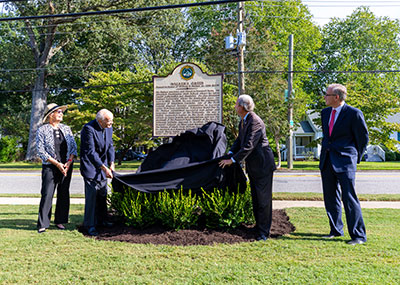
Above: Howard K. Walker, center, and his wife, Terry, help President Trible unveil the historic marker.
Read time:

Former U.S. Ambassador Dr. Howard K. Walker has fond memories of 72 Shoe Lane.
Chief among them are the many Saturdays spent mowing the sweeping lawn that is now named after his father, William R. Walker Jr.
Christopher Newport recognized the contributions of the local leader and former member of the Board of Visitors with a ceremony unveiling a historic marker in William Walker's honor.
The plaque, located next to the Gregory P. Klich Alumni House, designates the lawn as "Walker's Green" and honors Walker's life and accomplishments. The marker is located on the same address and site where his house once stood at 72 Shoe Lane.
The sign acknowledges Walker's opposition to locating Christopher Newport College in what was once an African American neighborhood.
"He was wronged by his neighbors, but instead of reacting with anger, he chose to serve and lead and love this community. He helped lay the foundation for this great university and he helped build Newport News into a more vibrant, diverse and multicultural city. William Walker helped make the world better," said President Paul Trible.
Howard Walker, the last surviving member of his father's immediate family, and his wife Terry took part in the designation ceremony. Members of the Board of Visitors, university community and elected officials attended the event.
Howard Walker captivated the crowd with stories of his father, who he said was a multifaceted man of many passions.
"Like its appointments of local citizens like my father to its Board of Visitors, Walker's Green symbolizes to me Christopher Newport's recognition and public declaration that the Virginia Peninsula community that is serves is plural in its makeup, a rainbow of individuals who belong to a variety of groups, sometimes with separate identities and interests, and sometimes with shared and overlapping ones. May that, President Trible, forever be part of this university's vision and its mission, and I know it is under your leadership," said Howard Walker.
Dr. Phillip Hamilton, professor in the Department of History, first came across the origins of Christopher Newport's campus when researching its history for his book, Serving the Old Dominion: A History of Christopher Newport University. Then-Faculty Senate President Dr. Brian Puaca also became interested in the story and garnered support for honoring the site of Walker's former home.
"Most of us here are from somewhere else, so our knowledge of what happened here is limited," Puaca said. "Now we have a chance to recognize somebody who was such a remarkable person and, at the same time, to spark curiosity about the history of this place."
A Newport News native, William Walker served the community and the Virginia Peninsula in many ways. After graduating magna cum laude from Howard University, he returned to his alma mater of Huntington High School and taught mathematics and chemistry.
He later served as the community manager of Aberdeen Gardens, one of the first federal housing community projects in America. After World War II, he established real estate and insurance businesses in the area. He also served several terms as president of the Newport News Chapter of the NAACP.
In the early 1960s, the city of Newport News considered two possible sites for Christopher Newport College's location, ultimately settling on 32 parcels along Shoe Lane. Much of that land was also home to African Americans whose families had lived there for decades.
Walker organized and led the African American landowners along Shoe Lane to protest the city's plans to purchase their property, fearing it would displace their community.
The city ultimately was able to secure the property and deeded it to the College of William & Mary, which at the time governed Christopher Newport. The first building opened in 1964.
Walker came to see the value of Christopher Newport's contributions to the community, serving three terms on the Board of Visitors. He died in 2004 at the age of 94.
"There is an importance to institutional memory that I think can get lost given all the rapid transformations that have happened here," Hamilton said. "I think it's an important story for the entire community to reconcile with."